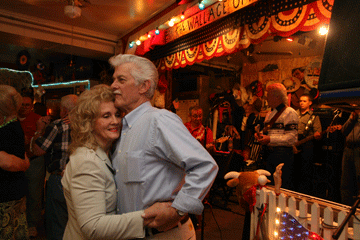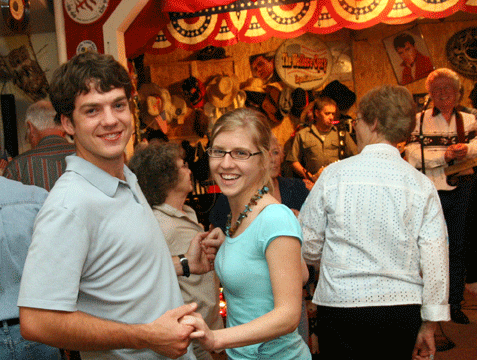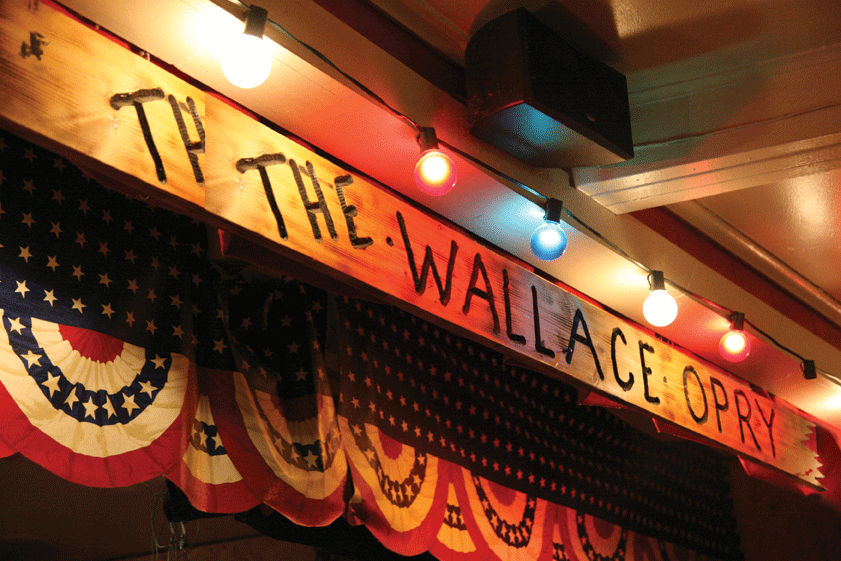 The word "dead" sounds a particularly jarring note when it is spoken here in the Highway 341 Country Cafe. At the next table, a tow-headed tyke tugs at the sleeve of his grinning papaw. At another table, euchre-playing couples smile and jest as they, by turns, gather the cards of winning and losing hands. There in the back, on the dance floor, gentlemen in best-dress boots and pressed flannel shirts two-step with hair-sprayed ladies as the band churns out a lively medley of country-and-western hits from the golden age of the Grand Ole Opry.
The word "dead" sounds a particularly jarring note when it is spoken here in the Highway 341 Country Cafe. At the next table, a tow-headed tyke tugs at the sleeve of his grinning papaw. At another table, euchre-playing couples smile and jest as they, by turns, gather the cards of winning and losing hands. There in the back, on the dance floor, gentlemen in best-dress boots and pressed flannel shirts two-step with hair-sprayed ladies as the band churns out a lively medley of country-and-western hits from the golden age of the Grand Ole Opry.
And yet, amidst all this life, people from in and around Wallace, Indiana—located about 20 miles west of Crawfordsville in rural Fountain County—say "dead" again and again. It is the word they use to describe what this town of fewer than 100 inhabitants would be without the Highway 341 Country Cafe and its tiny music hall, the Wallace Opry. Discordant as the word may sound amid the laughter and music, it hits home when you step out on the front porch of the restaurant and take in the rest of Main Street Wallace. The storefronts are dark or boarded. Buildings are in disrepair. The sidewalk is empty, save for a lone, roving hound dog. The illuminated neon "Open" sign in the window behind you is the only one you’ll find for miles in either direction.
"Before they opened this place, Wallace was just a place to drive through," says Dennis Long, who plays bass in a gospel band that performs here on Monday nights. The town where he lives, Nyesville, a former coal-mining town about 25 miles away, is already departed, he says, like town after town along the country roads of western Indiana. "They’re all just dead," he says.
Wallace might have suffered the same fate, were it not for Tony and Linda Shuman.
Tony was a product and longtime resident of Covington, the Fountain County seat, before his career as a plant production manager pulled Linda and him out of Indiana and into Illinois, then Georgia, then Virginia, and, finally, Alabama.
By 2001 a full 38 years after he began following his job from place to place, Tony had begun to realize what he was missing—home and music. As a young man, he had been a prolific and dedicated guitar player, performing country music to delighted audiences around the region of his birth. But he had left that behind, too. Until fate intervened.
"I had quit playing music all the time I was gone," he says. "But I ran into a couple of good ol’ boys in the Alabama mountains, and we started playing around with music a little bit."
When the fledgling group got a gig at a local restaurant, says Linda, "people started coming." The seed was planted. "We thought, Maybe we should try this at home," she says.
 Starting in 2001, on a visit back to the area, the Shumans began their search for a site suitable to their vision. They combed more than half a dozen burgs across several counties, from Cayuga to Covington. The pickings were slim. Along the way, they had come across what was then the Wallace Restaurant, a longtime general store that, at the time, was limping along as a modest lunch counter and grocer. But it would take another year before the Shumans’ search would bring them back to Wallace. After many years of trying to make a go of it, the Shumans learned, the Wallace Restaurant’s owner was ready to pack it in—and the doors to Wallace’s last remaining storefront business were about to close. What might have been another bad break for Wallace turned out to be the Shumans’ good fortune, and Wallace’s.
Starting in 2001, on a visit back to the area, the Shumans began their search for a site suitable to their vision. They combed more than half a dozen burgs across several counties, from Cayuga to Covington. The pickings were slim. Along the way, they had come across what was then the Wallace Restaurant, a longtime general store that, at the time, was limping along as a modest lunch counter and grocer. But it would take another year before the Shumans’ search would bring them back to Wallace. After many years of trying to make a go of it, the Shumans learned, the Wallace Restaurant’s owner was ready to pack it in—and the doors to Wallace’s last remaining storefront business were about to close. What might have been another bad break for Wallace turned out to be the Shumans’ good fortune, and Wallace’s.
"The building was run-down, like an old barn," says Tony. "But it was big enough that we saw we could do what we wanted to do."
The Shumans bought the place in 2003, tore out a wall, built a stage in the back, overhauled the kitchen, and covered the walls with close to 100 gallons of red and white paint (in keeping with Tony’s lifelong admiration for former Indiana University basketball coach Bob Knight). And perhaps most important, Tony started calling old band members he hadn’t played with for years, notably John Covault, a charismatic and well-quaffed country singer who would become the frontman for what is now the Highway 341 Band and the de facto master of ceremonies at the Wallace Opry.
With the Shumans living in an apartment upstairs, the restaurant opened that same year; they had found a home, and in ways the Shumans couldn’t have anticipated, people from Wallace and beyond found a home with them.
"They were ready for something small and hometownish," says Linda, "a friendly place where they could forget about their troubles. The town needed it and the people needed it. And they gave us the go-ahead to let their town come alive again."
Within weeks after Tony and the band started playing, word traveled fast that something was going on in Wallace—tiny, nowhere Wallace—and folks from five counties flocked to see what all the fuss was about. Before long, Saturday nights were so crowded that the Shumans had to start taking reservations and turning people away at the door. Now, some five years later, as many as 200 people are packed into the Opry on its busiest nights, many of them jammed elbow to elbow into long rows of picnic tables near the stage.
 Clearly, the Highway 341 Country Cafe is onto something, and there is an obvious explanation for its popularity: It provides a homey, smoke-and-alcohol-free venue where its largely aging clientele can enjoy a night out—where, unlike at some unruly rural honky-tonk, the music starts at dinnertime and ends by 9 p.m.
Clearly, the Highway 341 Country Cafe is onto something, and there is an obvious explanation for its popularity: It provides a homey, smoke-and-alcohol-free venue where its largely aging clientele can enjoy a night out—where, unlike at some unruly rural honky-tonk, the music starts at dinnertime and ends by 9 p.m.
"We sat at home and watched the boob tube before this came along," says D.J. Farley, who, along with husband Gordon, learned about the Cafe through their Crawfordsville square-dancing club last year and have come back two or three nights a week ever since.
"So many of the elderly people here hardly got out at all," says Lou McKinney, a resident of nearby Veedersburg. "This gives them something to do, and they love it."
It is not uncommon, on any given Saturday, to hear an enthusiastic Covault announce a 50-year wedding anniversary from the stage, or to see an 80-year-old woman shake a leg to an Elvis Presley song on the dance floor.
But Opry-goers are enjoying something more meaningful than simple entertainment as well. The story of Wallace is the story of many a dead or dying village across Indiana and, indeed, the United States. In the 1960s it lost its local school, an important symbol of community pride, to consolidation. Interstates and widening state highways took away traffic. Businesses and post offices closed. Sons and daughters moved to larger towns and cities in search of work and never came back. The success of the Highway 341 Country Cafe gives people who knew small towns the way they used to be, whether in Wallace or elsewhere, hope that the way of life they grew up with can still exist in a world of Wal-Marts and fast food.
"This restaurant has given us so much, you can’t put a cash value on it," says Linda Shuman. "It has taken us back to the good times."
Look around and you’ll see. This isn’t just a place to eat homemade pie and make song requests. It’s a place where friendly faces greet you with a hearty "Hello" or a "Hey there, stranger." It’s a marketplace ("I’m trying to find a starter for a John Deere tractor") and a hotbed of gossip ("Is that a wig?"). It’s local teenagers who get their first jobs waiting tables and it’s adults who carry dirty dishes back to the kitchen just because they want to help out. It’s a town hall, a family reunion, and a church pitch-in.
"People in a lot of small towns would love to have some place like this," says Marilyn Sowers, a resident of Wallace for more than 50 years.
Then again, a lot of people in big towns would, too.
Evan West is a contributing editor to Indianapolis Monthly magazine and a member of WM’s editorial advisory board.
Top Photo: Walter Maxwell and a lady friend dance to the music of the Highway 341 Band.—photo by Clayton Craig '08
Middle Photo: Wabash photographer Clayton Craig ’08 and his fiancee, Carlyn Corinne Schafer, were invited to the microphone and joined in the dance.